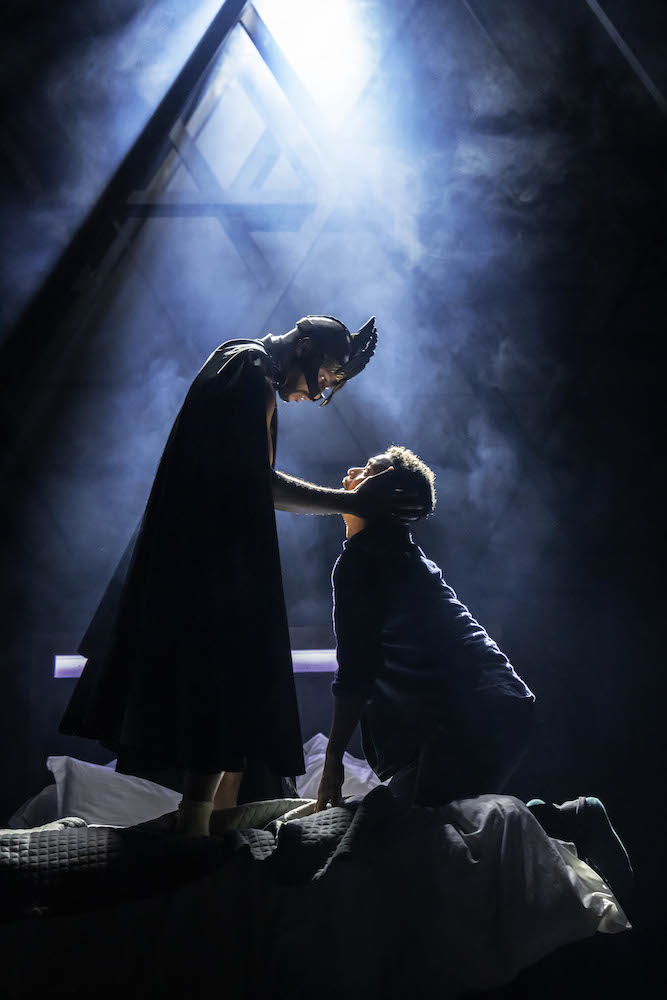The act of idol worship is, at one and the same time, both distantly ancient and compellingly contemporary. Whether it is Superman, Wonder Woman or Black Panther, our love of the superhero is both an aspiration and an abnegation. Looking at a star, the fan sees both their own potential and feels their own inferiority. In Olivier award-nominated actor and activist Danny Lee Wynter’s Royal Court debut, the attractively titled Black Superhero, the ambitious theme of black queerness is explored through the conceit of hero worship in a show whose cast is led by the author.
Wynter is David, an unsuccessful 39-year-old mixed race queer actor who is struggling with mental health issues and currently living with his sister Syd. He has a friendship group of other black actors, which include Raheem and especially King, a black American who has become a popular celebrity and star through the portrayal of Craw, a Marvel-comic-style superhero. David, of course, is one of King’s legion of fans. The story takes shape when King – who announces that his marriage to “boring” white travel writer Stevie is now open – first has sex with David, and then invites him on his Crawtopian press tour of Australia. Syd, meanwhile, is pregnant.
The idea of Black Superhero, which aspires to compare and contrast gay and straight sex and marriage, is an ambitious one, and it’s no spoiler to say that Wynter doesn’t manage to pull it off. This is partly due to the noise generated by the personalities that crowd the story: not only the pretentious white liberal Stevie, but also the black older bisexual Kweku, who has sex with David in Australia, and other Antipodian white characters, such as an intrusive interviewer and Jackson, King’s press agent. Random people, such a white guy called Twink, wander in, and then wander out. Wonder why? No idea. Then room service arrives, flirts and then... just vanishes.
 So while David’s story of rivalry with Syd, siblings who both claim to have different memories of their childhood (hers positive; his negative), is a compelling one, and also involves David’s daddy issues (their frequently absent and violent father), the play’s focus is blurred by other material. During the play I often wished that Wynter would just stick to his exploration of his central character’s psychology, his ambiguous attitude to therapy, and his feelings of professional failure (in stark contrast to the wild success of his hero King). The hints of self-harm and substance abuse ache for deeper treatment.
So while David’s story of rivalry with Syd, siblings who both claim to have different memories of their childhood (hers positive; his negative), is a compelling one, and also involves David’s daddy issues (their frequently absent and violent father), the play’s focus is blurred by other material. During the play I often wished that Wynter would just stick to his exploration of his central character’s psychology, his ambiguous attitude to therapy, and his feelings of professional failure (in stark contrast to the wild success of his hero King). The hints of self-harm and substance abuse ache for deeper treatment.
Instead, what we get is a rather clichéd view of gay relationships in which the main subject of discussion is sex, sex, sex. Sextopia. Of course, a lot of this is humorous, with dick jokes rubbing up against anecdotes and brief instances of jealous anguish, but the body fetishism of some of the main characters remains sadly unexplored, and David’s friendship group is left behind when he travels to Australia. At the same time, there is a tonal mismatch between the satire of the show (especially good at putting down white liberals who claim to know more about racism than black people) and its more serious moments.
Central to David’s rather abrasive character is his disputatious nature. He passionately believes that black stories should be told by black people, and that queer black stories should feature queer black actors. He criticises the 2016 film Moonlight because director Barry Jenkins is not gay, and its depiction of sex is a “lackluster handjob on a beach”. It’s a gay film “wid no gay sex”, to avoid offending “squeamish straights”. And it lacks humour – “Queers are funny!” David also gets into an argument with actor Raheem about not using his fame to promote the cause of gay blacks, while the other answers that he doesn’t want to be pigeonholed.
Despite this interesting material about identity and activism, Black Superhero is clumsy in its storytelling, and the good jokes don’t make up for the uncertain tone of the writing. Even the central conceit of David’s idolising of Craw – in fantasy scenes where King turns into his heroic persona, with billowing cape and winged headgear – is underdeveloped and never delivers on its promise. The addition of a black superhero identity for Syd does nothing to clarify this dream world, although in her everyday persona she does get some of the best lines: “Stickin it to a married man never ends well – no one wants to be Camilla.” Followed by David’s provocative comment that, compared to Diana, at least she’s still alive.
The blurred nature of the writing is not helped much by Daniel Evans’s production, which is set in an abstract space which looks flashy but impersonal. Joanna Scorcher’s design and Ryan Day’s lighting looks great, but, apart from Wynter, the rest of cast are not always comfortable in the space. Solid performances from Dyllón Burnside as King, Eloka Ivo as Raheem, Rochenda Sandall as Syd and Ako Mitchell as Kweku are not enough to make up for the lack of drama, and nor are the billowing capes (Burnside and Wynter pictured above) and aerial descents of the fantasy scenes. It’s a great idea to use theatre to explore the theme of acting, and how people of colour perform their blackness and their queerness, but this play is just too messy to fulfil this ambition.















Add comment